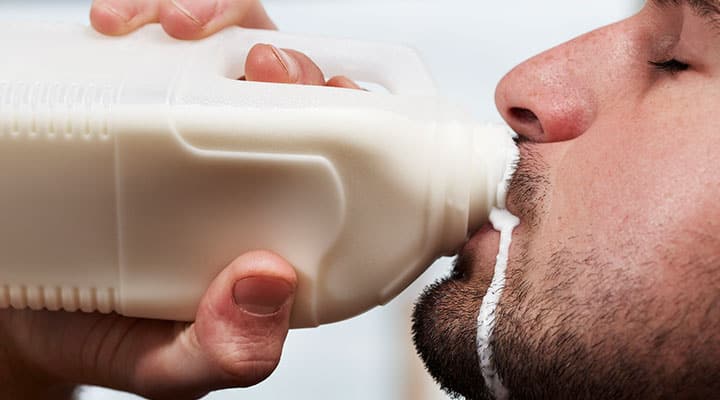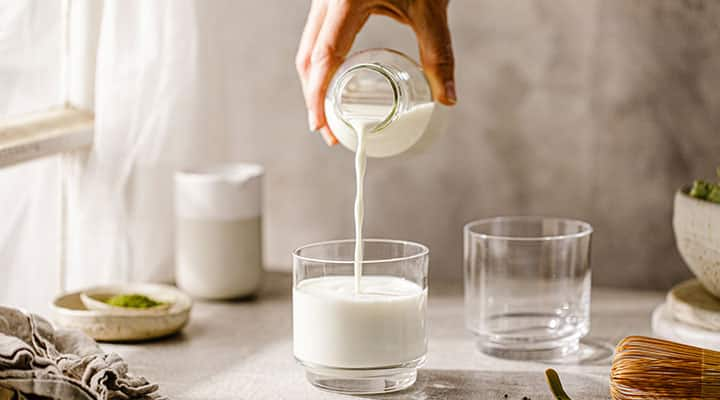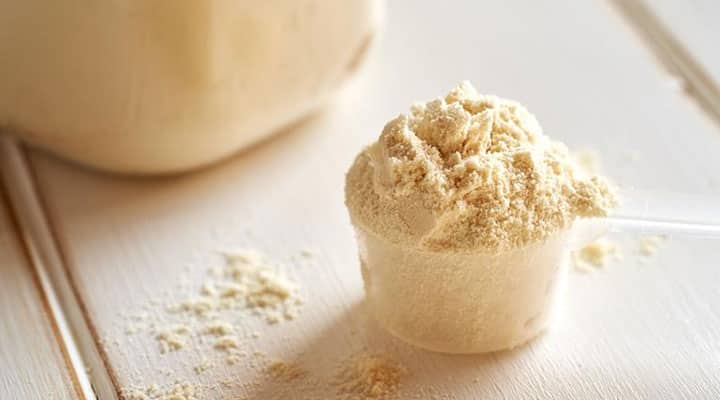
Is It Safe To Drink Raw Milk?
Published: August 2024
Got facts? You may have seen social media posts and TikTok videos advocating raw milk consumption for immune health, but taking that advice could be a raw deal.
Certain milk-related compounds can help support your immune system, but with bird flu infecting dairy cow herds across multiple states, concerns about raw milk consumption have spread as well.
The good news is you don't have to drink raw milk, or any milk, to get the benefits of milk compounds. We'll examine the myths and facts around raw milk and heat-pasteurized milk and explore some better ways to maintain your immune health.
Is raw milk good for your immune system?
The debate about drinking raw milk to support your immune system is making headlines largely because of the worldwide spread of bird flu, which began to infect cows in the United States in early 2024. On August 1, 2024, the Centers for Disease Control reported cases in cows in 13 states, with 174 dairy herds affected. Fourteen cases had been reported in humans.
Maybe because of the lingering emotions related to the 2020 global pandemic, news about a new type of flu in the milk supply has garnered tremendous attention. But misinformation has gained traction as well. So, let's examine the facts.
Myth: Raw milk consumption is safe and boosts immune function.
Fact: Research from an FDA food safety report clearly demonstrates the hazards of drinking raw milk. Evidence shows raw milk is not an immune-building food and is particularly dangerous for children and older adults.
Myth: Drinking raw milk will protect you from bird flu or other infectious diseases.
Fact: The CDC reported that half of two dozen farm cats were infected and died in March 2024 after consuming raw milk from cows infected with bird flu. While humans are not affected by bird flu in the same ways as cats and other mammals, scientists are concerned about mutations that could enable bird flu to adapt and spread among people.
Myth: Raw milk contains health-promoting immunoglobulins such as IgG that are destroyed by the process of pasteurization.
Fact: According to the FDA, IgG is heat-stable, and studies show zero to little effect on IgG levels from heating milk during pasteurization. The FDA also states the levels of immunoglobulins in milk are low to begin with and don't have much effect in humans.
Myth: Raw milk is a treatment for lactose intolerance and allergies.
Fact: A European review of multiple studies found no link between raw milk and lactose intolerance. While some studies have reported associations between raw milk consumption and reduced prevalence of allergies, these studies have often suffered from considerable methodological weaknesses. Others have shown that there is no difference between raw or pasteurized milk in the tendency to elicit an allergic response in allergy-prone individuals.
Is raw milk consumption healthy?
From food safety research, we know raw milk consumption is not safe. Raw milk can contain many germs that can make you sick, including pathogens like campylobacter, salmonella, listeria and e-coli. These pathogens can come into contact with cow's milk from the cow's udders, milking equipment and more.
Before widespread milk pasteurization, one in four cases of foodborne illness was attributable to pathogens in raw milk. As our understanding of the risks of raw milk improved and pasteurization became standard practice, that rate has now fallen to less than 1%. But in areas of the world where raw milk consumption is more common raw milk, disease outbreaks and hospitalizations from drinking unpasteurized milk are higher.
Certain people may be at higher risk from raw milk and raw milk products, including young children, pregnant women and elderly adults. People with weakened immune systems, such as cancer patients or those who have received an organ transplant, are especially at risk from the pathogens in unpasteurized cow's milk.
Experts strongly recommend that milk be pasteurized before consumption.
Is pasteurized milk good for you?
Some have claimed, without compelling evidence, that pasteurization makes milk less nutritious. But a systematic review of data from 40 studies found the effect of pasteurization on milk's nutritional value was minimal. And when a group of scientists from Europe conducted a thorough review of the risks and benefits of raw milk vs. pasteurized milk, they concluded that pasteurization doesn't substantially change the nutritional content or health benefits associated with milk consumption.
Heat-treated cow milk can be part of a well-balanced diet. Healthy dietary patterns, like the Mediterranean and DASH diets, allow for a moderate intake of dairy products.
Lactoferrin: Milk-derived immune support
As we've seen, drinking raw cow's milk will not boost your immune system and could even make you sick from a number of different pathogens. But there may be immune benefits from pasteurized cow's milk, in part due to a compound called lactoferrin that has immune-supportive properties.
Lactoferrin is a specialized protein that participates in protecting the body against germs and modulating the immune response. It occurs in secretions like milk and saliva. Cows and humans both produce lactoferrin, but the structure of the protein differs between the species. Many studies in different species, including humans, have evaluated the ability of different formulations and dosages of lactoferrin to protect against germs.
For instance, in 2022, Australian researchers published a meta-analysis of lactoferrin studies. They looked at 25 studies across diverse populations, including adults and children, and found lactoferrin supported respiratory immunity in most of the studies. It also reduced at least one marker of systemic inflammation in adults in most of the relevant studies. Lactoferrin dosages used in the studies ranged from 35 mg–800 mg.
The researchers concluded that lactoferrin may improve immune function.
Whey protein: Buff up your immune system
Although nutritional whey protein is often used by people interested in building muscle, it has some surprising immune benefits as well. Whey protein accounts for about 20% of the protein content in milk, and it contains several bioactive compounds that can support immune health. Lactoferrin is one of them!
A study in older adults in Finland assessed the effects of six months of whey protein intake. About 100 participants added either 20 g of whey protein to their diet or took a placebo daily. At the end of the study, the researchers found that whey protein intake was associated with fewer infections.
Whey protein may also enhance the immune response to vaccinations in older people. One small study showed that healthy senior citizens who took whey protein for eight weeks and then got a pneumonia vaccine had a better immune response to the vaccine than those who took a soy protein control formula.
What are other ways you can support your immune health?
Health fads come and go. Enthusiasm for raw milk consumption is up right now, but don't get caught up in the hype. The science is clear: Raw milk is not healthier than pasteurized milk and could even make you sick.
Instead, take steps to support your immune system—like exercising and eating a balanced diet with lots of fruits and vegetables with vitamin C. Also, consider adding dietary lactoferrin and whey protein to your diet.
Adequate and restful sleep is also important for immune health. If you sometimes struggle to get the rest you need, maybe a cup of warm pasteurized milk—or some milk peptides—will do the trick!
It's also important to evaluate your immune health. Life Extension® offers an immune panel that includes a complete blood count and measurements of white blood cells like natural killer cells, which help defend against infection and/or prevent the progression of viral diseases.
About the Author: Blake Gossard is a passionate advocate for clear communication of evidence-based health information. He is a Certified Medical Writer (MWC), a board-certified Editor in the Life Sciences (ELS), and a Certified Medical Publication Professional (CMPP). Blake is the president of the Florida chapter of the American Medial Writers Association and the Chief Editor of Life Extension’s Disease Prevention & Treatment content.
References
- Ali AS, et al. "Lactoferrin reduces the risk of respiratory tract infections: A meta-analysis of randomized controlled trials." Clin Nutr ESPEN. October 2021. https://pubmed.ncbi.nlm.nih.gov/34620326/
- Aquilani R, et al. "Effects of oral amino acid supplementation on long-term-care-acquired infections in elderly patients." Arch Gerontol Geriatr. May-June 2011. https://pubmed.ncbi.nlm.nih.gov/20934757/
- Berthon BS, et al. "Effect of Lactoferrin Supplementation on Inflammation, Immune Function, and Prevention of Respiratory Tract Infections in Humans: A Systematic Review and Meta-analysis." Adv Nutr. October 2022. https://pubmed.ncbi.nlm.nih.gov/35481594/
- Björkman MP, et al. "Whey protein supplementation in nursing home residents. A randomized controlled trial." European Geriatric Medicine. June 2012. https://www.sciencedirect.com/science/article/abs/pii/S1878764912000733
- Burrough ER, et al. "Highly Pathogenic Avian Influenza A(H5N1) Clade 2.3.4.4b Virus Infection in Domestic Dairy Cattle and Cats, United States, 2024." Emerging Infectious Diseases. July 2024. https://wwwnc.cdc.gov/eid/article/30/7/24-0508_article#
- Claeys WL, et al. "Raw or heated cow milk consumption: Review of risks and benefits." Food Control. May 2013. https://www.sciencedirect.com/science/article/abs/pii/S095671351200535X
- Freeman SL, et al. "Dairy proteins and the response to pneumovax in senior citizens: a randomized, double-blind, placebo-controlled pilot study." Ann N Y Acad Sci. March 2010. https://pubmed.ncbi.nlm.nih.gov/20388140/
- Gorissen SHM, et al. "Protein content and amino acid composition of commercially available plant-based protein isolates." Amino Acids. December 2018. https://www.ncbi.nlm.nih.gov/pmc/articles/PMC6245118/
- Koski L, et al. "Foodborne illness outbreaks linked to unpasteurised milk and relationship to changes in state laws – United States, 1998–2018." Epidemiology & Infection. October 2022. https://www.cambridge.org/core/journals/epidemiology-and-infection/article/foodborne-illness-outbreaks-linked-to-unpasteurised-milk-and-relationship-to-changes-in-state-laws-united-states-19982018/4822109E69DDAB37E92CAAB41AB1CC0F
- Macdonald LE, et al. "A systematic review and meta-analysis of the effects of pasteurization on milk vitamins, and evidence for raw milk consumption and other health-related outcomes." J Food Prot. November 2011. https://pubmed.ncbi.nlm.nih.gov/22054181/
- Madureira AR, et al. "Invited review: Physiological properties of bioactive peptides obtained from whey proteins." Journal of Dairy Science. February 2010. https://www.journalofdairyscience.org/article/S0022-0302(10)71487-9/fulltext
- Oliver SP, et al. "Food safety hazards associated with consumption of raw milk." Foodborne Pathog Dis. September 2009. https://pubmed.ncbi.nlm.nih.gov/19737059/
- Weeks CE, King RL. "Bioavailability of Calcium in Heat-Processed Milk." Journal of Food Science. July 1985. https://ift.onlinelibrary.wiley.com/doi/abs/10.1111/j.1365-2621.1985.tb13021.x
- "H5 Bird Flu: Current Situation." Centers for Disease Control and Prevention. August 2024. https://www.cdc.gov/bird-flu/situation-summary/index.html
- "NEHA Position Regarding the Sale or Distribution of Raw Milk." Journal of Environmental Health. March 2008. https://www.proquest.com/docview/219724235
- "Raw Milk." Centers for Disease Control and Prevention. April 2024. https://www.cdc.gov/food-safety/foods/raw-milk.html
- "Raw Milk Misconceptions and the Danger of Raw Milk Consumption." U.S. Food & Drug Administration. March 2024. https://www.fda.gov/food/buy-store-serve-safe-food/raw-milk-misconceptions-and-danger-raw-milk-consumption
Always be in the know!
Access the latest deals, wellness news, expert health tips & more!










